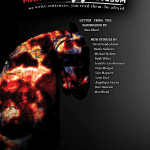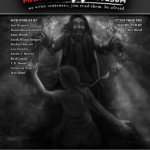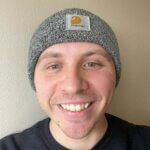I stumble slightly on my way down from my parents’ musty attic, nearly toppling the precarious stack of plastic storage bins in my arms.
My father looks up briefly, permanent marker in hand, before going back to labeling the mass of cardboard boxes swarming the hallway. “You okay, dollface?”
“Dollface?” my boyfriend repeats, a look of unabashed delight on his face.
“Fine,” I say to my father. And to Kevin, with a good-natured frown, “Shut up.”
Taking the top two containers from the pile I’m carrying, he follows me into my childhood bedroom to help me fit them in yet more cardboard boxes. I think my parents must have cleared out every liquor store in the area of their recycling in anticipation of this move.
“I will not shut up. This embarrassing nickname just made driving three hours to help your parents move totally worth it.”
I roll my eyes at his teasing grin. “Well, then you have the three-hour drive home to forget you ever heard it,” I say, pausing after bending over to close a box. My knee again.
It’s happened for as long as I can remember, I’m used to it, but it’s been happening with more frequency the past few weeks.
If Kevin notices the delay in me standing up, he doesn’t mention it. “So why do they call you Dollface, Dollface?”
As if hearing the siren song of an opportunity to embarrass her daughter, my mother sweeps into the room at this moment. Her hair is frazzled from running her hand through it too many times, but she keeps her face and voice cheerful in an attempt to hide her obvious exhaustion. “Haven’t you seen her baby pictures?”
“I have not,” Kevin says, his smile growing obnoxiously wider. It’s a good thing I love this dork so much.
“Oh, I’ll have to show you when we unpack them, but she was the most beautiful baby, weren’t you, Diana, before you were diagnosed? Just the biggest, bluest eyes, the rosiest cheeks you’ve ever seen. Just like a porcelain doll—” She frowns at me. “What’s wrong with your leg?”
“It’s nothing,” I say, even as I have to sit down on my bed when my knee threatens to give out again.
It isn’t my bed, I suppose. Not in a technical sense. My room became a guest room when I went away to college. Same wallpaper, new everything else, my stuff packed away into the attic.
But it feels like nothing has changed, it feels like I’m home sick from school, sitting on my old Sailor Moon sheets with my cadre of plastic ponies staring down at me from my shelves. A feeling that has everything to do with my hovering, fussing mother, no doubt.
I swat her away dismissively. “I’m fine, it’s nothing.”
From a practical standpoint, that’s true. The joint can still move with relative ease if I lift my lower leg with my hand, but there’s a sort of… rigidity to my muscles and tendons, locking them in place when I try to bend or straighten my knee. It doesn’t cause much trouble, and it passes quickly enough.
But there’s always that lingering fear in the back of my mind, that inescapable fact that I have a degenerative neuromuscular disease and sooner or later—probably sooner—I will not be fine.
It’s a miracle, if you believe in those kinds of things, that I’ve lived this long with relatively few complications. Every time it happens, I wonder if this is it, if this is when my luck runs out.
#
“No, I have to go back to work tomorrow,” I insist for what must be the fifth time, dodging my father’s well-meaning attempt to relieve me of the box of dishes I’m bringing into the new house.
I’m not sure I could let go of it if I wanted to, right now, anyway. When I get to the kitchen, I lean against the counter, still hugging the box tight instead of putting it down with the others, and wait for my elbows to loosen up.
“Nonsense,” my mother says, holding up her bird sounds clock in various places with the gravity of a director framing a shot. “You’re sick, you can call out. The swamps won’t be found guilty of murder just because you’re not there.”
I stopped trying to explain to her what environmental lawyers do years ago. About the same time I realized she understood perfectly, she just didn’t care because I didn’t go along with her plan for my life she made when I was little.
I’m honestly kind of surprised she learned Kevin’s name, since she was so dead set on me marrying golden boy football player Bradley Mafino for some reason.
Well, in retrospect, she was probably trying to take back as much control as she could from my diagnosis. They weren’t even sure I would survive childhood at first, though thankfully the disease didn’t progress as fast as they thought it would. She probably wanted, in her own, twisted logic way, to make every other part of my life as perfect as it could be.
Maybe I can understand why she did it, but it got exhausting very fast.
“I’m not sick,” I say again. My muscles finally listen to me, and I set the box down and begin unpacking the glasses. “And even if I was sick, it doesn’t mean I need my mother to take care of me.”
As I went to put a glass in the cupboard, I felt that tightness again, in my fingers this time. I should have stopped, taken a moment for the sensation to pass.
But then, I would have to admit something was wrong.
The glass slips from my hand, shatters on the counter. I mutter an apology, instinctively reaching for the larger shards before my mother can help me with them.
My hand is clumsy, my fingers stuck to each other as if trapped in an invisible mitten. I’m too busy staring, panic rushing through my veins, to realize I’ve cut myself.
My mother notices first, grabbing my rigid wrist and pulling me to the sink. To wash away the blood, but what blood? Why isn’t there blood?
“Mom!” I yell, pulling my hand away to examine it.
By now, my father and Kevin have rushed in, and we all see the deep gouge in my palm. They wince as I spread the skin with my good hand, but it doesn’t hurt.
I don’t feel anything.
There’s no blood, and I don’t know what such a deep cut should look like, but there should be something, right? Something under the skin? Tendons, muscles, bones?
There isn’t. It’s just skin—firm, but pliable like a soft plastic—all the way through.
#
We should go to the emergency room, I know we should—we all do—but my parents are even better than I am at pretending everything is fine and somehow I find myself laying in their unpacked guest room, my mother hovering and fussing.
My hand came back to life briefly, long enough for the wound to close up and hide the unsettling lack of biology. Long enough to make me wonder if I imagined it. But it’s locked back into place again along with both of my knees.
There’s nothing online about it. No case studies of people, with or without my diagnosis, having their limbs suddenly turn prosthetic.
That’s what Kevin tells me, anyway. My other hand is getting stiff, too, so I can’t use my phone very easily and have to rely on him.
“Just let me see,” I ask again, propping myself up awkwardly on arms I can barely feel, angling my neck to look at his screen. “What did you search for? Try phrasing it—”
He pulls away from my bedside, turning so all I can see is the back of his phone and his irritated scowl. “I can handle it, just trust me.”
I do trust him. With my life, with my heart, with everything.
Over the past few weeks, I’ve even been entertaining the idea that maybe, if this visit with my parents goes well, I might bring up the idea of getting married. On the way home, of course. If my mother even hears the word “wedding,” she’ll have my dress picked out and a church booked for me within an hour.
I think she has a flower shop on speed dial.
So I trust Kevin. I do.
At the same time, however, I can feel my control over my own body slipping away, faster than I ever thought it would happen, and I am quite literally incapable of keeping a hold on it.
I reach for his phone with a desperation that surprises even me. I won’t be able to grab it, I won’t be able to use it, but I just need to try, I need to know what’s happening to me. And if that’s not possible, at least I need to know it’s not because I didn’t try.
My fingers hit his protective case with an audible clack, and Kevin grabs my hand to stop me.
I can feel it, his touch, but distantly. Indirectly. The way you can feel someone touching your leg through a pair of jeans.
There’s a moment when he looks at our hands, at the way he’s holding mine like he always does, where he seems… I’m not quite sure. Uncomfortable, almost. Like something has changed, beyond the biological structure of my limb and my ability to reciprocate the gesture.
The moment passes, and he slides his hand up to hold my wrist instead. “Diana. You need to stop.”
I’m sure I don’t, but it doesn’t feel worth fighting about. My mother’s fussing is going to be much more irritating; I should save my energy for that.
Kevin returns my hand to my lap, puts the other on top of it and starts adjusting my legs.
“I don’t need you to move me,” I say, trying to sound more playful than I feel.
“I know,” he says, moving me anyway.
I kick him away. Playfully. Maybe.
He says nothing else on the subject, just pulls up the covers and heads for the door, telling me he will check on me in a little while.
#
I don’t remember falling asleep, but I must have because I awake to the sounds of my father humming and cardboard boxes sliding across the carpet.
“What time is it,” I mumble, although I can hear my mother’s clock down the hallway. “Never mind. Blue jay, three o’clock,” I answer my own question, opening my eyes.
Correction. Trying to open my eyes.
My eyelids flutter slightly, my vision flashing from complete darkness to bright afternoon sunlight from the window but resist the pull of gravity. A quiet click of plastic accompanies each movement, and the drowsy half-asleep fog burns off like a magician’s flash paper. I am violently awake.
“Good old Cyanocitta cristata,” my father chuckles. Delightfully oblivious as always. “Enjoy your nap?”
Forgetting the rigidity of my hands, I grasp ineffectively at my face. There’s still some give, some softness, to my cheeks and mouth, thank God, but I can’t see, I can’t open my eyes.
“Dad!” I panic, my heart racing and my limbs fighting my attempts to sit up. “Dad! Help, I can’t see!”
He’s at my side in an instant, the bed dipping under his weight as he gently pulls me into a sitting position.
His face is the first thing I see when my eyes click open, concerned but smiling. “There you go,” he says, putting pillows behind me for support.
“I’m sorry,” I say. I can’t believe I overreacted like that, clearly my eyes are just fine—
Except I can’t close them now. Or move them. I can only stare, wide eyed, straight ahead.
“Dad!”
Gently, my father takes my head in his hands and tips it back. My eyelids close instantly, opening again when he helps me straighten my neck.
“See, you’re all right. Just move your head like this when you need to blink.”
“What… what the hell—”
He shushes me, like he used to when I was a little girl and kisses me on the forehead. I don’t feel it.
“Love you, Dollface.”
#
They unpack boxes of my old things—to “make me feel at home”—while they unpack reason after nonsensical reason why I can’t go to a hospital.
“It might go away,” my father says, hanging up old posters I thought I got rid of years ago. “You know as well as I do, your symptoms come and go. No reason to assume the worst. Imagine how embarrassing it would be to go through all those time-consuming tests, making a big deal about everything, only to be told to go home and get some rest?”
“I’m worried this is totally unrelated to your diagnosis and they’ll take you away, put you in some government lab and study you,” Kevin tells me, lining up a herd of plastic ponies I haven’t seen since I was a kid. “I wouldn’t want that, would you? And what if they figure out a way to weaponize whatever is happening to you? Do you want that on your conscience?”
“They’ll blame me,” my mother declares, taking one of my dolls out of a box and painstakingly putting every wayward hair back in place. “They always blame the mother. And you would let them, don’t deny it. Honestly, Diana. I’m beginning to think that you only want to go to the hospital because you just hate being around me so much. Is it so intolerable, letting me take care of you, that you’re pretending this is a medical emergency?”
My protests go unheard, my panic growing with every additional childhood memory they surround me with.
#
I can’t do this. I can’t stay here.
I don’t know if I can even stand, let alone walk, but I have to try.
The next time I’m alone, when my mother goes to make me a bowl of her chicken noodle soup I’ve always hated, I take my chance.
Sitting up is a struggle, my eyes flickering open several times before I finally manage to stay up. Then comes the task of pivoting in bed, of shifting my legs to hang over the edge.
My body fights me for every movement, my joints locking up and my skin numb to outside stimuli.
It doesn’t even feel like my body anymore. It’s just parts, connected with fraying wires to my consciousness that is trapped inside.
My body is barely responsive to my brain’s signals; I know how to move, I know how to bend my knee and straighten it, but I can’t convince my leg of that. And there isn’t any tactical feedback when I take my leg awkwardly in my hands and drag it across the bedspread, no sense of how hard I’m squeezing or how silky the fabric.
Do I even have a nervous system anymore, or am I just a piece of plastic with delusions of personhood?
My feet are on the floor, my body swaying unsteadily without the support of my pillows. If I have to concentrate to keep from falling over, how am I supposed to walk?
I take a few deep breaths, though my chest doesn’t expand and I just hear a lonely, hollow sound.
I always knew something like this was coming. Maybe not this, maybe not as fast, but I always knew I would get worse. I just kind of thought, when it happened, the people I love would be there to help me.
I think I’m stalling. I have to try, have to get it over with.
There’s a moment where everything works. I push off the bed, my legs support me, I’m standing.
And then, all at once yet somehow in slow motion, I collapse.
Every part of my body just gives out. As I crumple to the floor, my arm strikes a plastic container that my mother had been unpacking and the contents tumble down with me.
I come to rest with my limbs sprawled at awkward angles like a chalk outline at a crime scene, my head popped up enough on my arm to keep my eyes from snapping shut.
In front of me, a pile of dolls mirrors my anguish with emotionless faces.
#
They didn’t set the clock to be silent at night. Unable to relax enough to fall asleep, I lie awake behind closed lids, counting birdsongs to keep track of time.
Baltimore oriole, Northern cardinal, tufted titmouse…
Around a quarter past white breasted nuthatch, it occurs to me that Kevin didn’t kiss me good night like he normally does. I can’t remember if he even said it.
I can hear his slow, steady breathing next to me. At least one of us is able to sleep.
But I can’t feel him. Have I lost so much sensation in my body that I can’t feel his warmth, or the weight of his arm around me?
With some difficulty, I move my hand out, reaching, searching. I find his broad back at the edge of his side of the bed, at the furthest extension of my reach.
Maybe I hit him harder than I thought, I can’t tell. He stirs, grumbling, and turns over to face me, moving my hand back towards my own body.
“What is it?” he asks, more annoyed than concerned.
“You forgot to kiss me good night,” I say, hoping he forgot. Hoping there’s a reason he’s so far away, any reason other than the obvious.
“I didn’t forget,” Kevin says, and I can practically hear him frowning. “You woke me up for that? Really?”
I barely dare to ask, but I whisper, “Why?”
He makes a sound, like he can’t believe I have to ask, and I self-consciously go to touch my mouth. My lips click against my fingers, hard and cold but still movable, kissable.
“So it’s different,” I say. “I’m still me. I still love you.”
And you still love me, I don’t say, waiting for him to supply the words himself. He doesn’t.
Is that it, then? Is our relationship really so fragile that something like this can break it?
Am I really so hard to love like this?
I wish I could see him, see what he’s thinking. Is he looking at me with disgust or staring at the ceiling wishing he could help me?
After a long moment, he lets out a sigh. The bed shifts and then goes still; his footsteps precede the sound of the door closing with a soul crushing finality.
#
By the time black capped chickadees announce the arrival of morning, I’ve lost more than just Kevin.
My limbs lay heavy and motionless, ignoring all attempts at movement as my mother gently undresses me. I have no control, my body is no longer my own.
It even looks unfamiliar, unnatural, when she lifts my head and my eyes open enough for me to notice. The skin is too smooth, too uniform. The breasts are undefined globes affixed in place, the area between the legs lacking any real anatomy.
I’m grateful when my mother covers the body again, but her clothing choice leaves a lot to be desired.
“Mom, I don’t wear dresses. Especially not…” How do I even describe it? “Little House on the Prairie dresses.”
“I’ve noticed,” she says, and my vision blinks out briefly as she tilts my head back to get the blue calico fabric over it.
When my eyes open, it’s to the horrifying sight of my mother twisting my arm at an unnatural angle while putting it through the sleeve. Elbows shouldn’t bend that way.
A surge of phantom pain goes through me before I realize I don’t feel a thing. The arm is practically out of the socket, and I don’t feel a thing.
“I don’t want to wear it,” I protest, watching her calmly set the limb back in place. “I want to wear—” I almost try to point to my suitcase, resorting to stiffly turning my head in that direction instead. “I want to wear my own clothes.”
She starts fussing with my hair, one hand on my forehead to keep me from fighting her. “I thought I might bring you to the kitchen later, have you sit with me while I have lunch.”
“No—”
“Of course, I have my book club coming over later, so I’ll have to put you away for that. But maybe your father will come and play with you.”
It’s not just my body.
My life is no longer my own.
It belongs to my parents, for them to mold as they wish. All I have left is my voice.
“Mom, I don’t—”
“Doesn’t that sound good, Dollface?” she asks, setting down the brush and reaching a hand down the back of my dress.
I open my mouth to argue, and my mother pulls a string I didn’t know I had. The voice is mine, the words are not.
“Yes, mother. Whatever you say.”
Jennifer Lee Rossman (they/them) is a queer, disabled, and autistic author and editor from the land of carousels and Rod Serling. Their work has been featured in dozens of anthologies, and they have been nominated for Pushcart and Utopia Awards. Find more of their work on their website http://jenniferleerossman.blogspot.com and follow them on Twitter @JenLRossman









